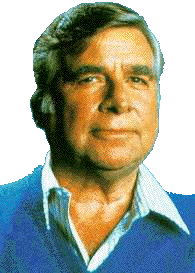August 19: Gene Roddenberry
Gene Roddenberry (1921)
It was on this date, August 19, 1921, that the creator of the Star Trek TV series, Eugene Wesley Roddenberry was born in El Paso, Texas. The family moved to Los Angeles before Gene was two and his father became a career police officer. Roddenberry took classes in law enforcement but got a pilot's license before his 19th birthday. Joining the Army Air Corps in 1941, he was called to active duty when the Japanese attacked Pearl Harbor that December. He flew combat missions in the South Pacific.
After the war, Roddenberry piloted for Pan American airlines, but gave it up to take a job, as his father had, as a police officer in Los Angeles. However, something creative was stirring in him because he moonlighted writing TV scripts, a skill he taught himself by borrowing scripts and diagramming TV shows he watched. At the same time, he passed his sergeant's exam. But by 1956 Roddenberry had given up the LAPD to write for television full time. He was successful, too, with many produced scripts and TV series to his credit.
But Roddenberry's legacy was the Star Trek TV series, beginning in 1966 and continuing, often against the wishes of Paramount Studios, by popular demand, through an animated series, the Next Generation, Deep Space 9, Voyager, Enterprise, several films with the original and new casts, and other permutations on the theme. And the theme always expressed Roddenberry's personal philosophy of godless humanism.
Reared a Baptist, Gene Roddenberry went to church as long as he was forced to. "I guess I was around fourteen and emerging as a personality," said Roddenberry in a 1991 interview,
I listened to the sermon and I remember complete astonishment because what they were talking about was things that were just crazy. It was communion time, where you eat this wafer and are supposed to be eating the body of Christ and drinking his blood. My first impression was, "This is a bunch of cannibals..." I guess from that time it was clear to me that religion was largely nonsense – largely magical, superstitious things. ... Santa Claus doesn't exist. Yes, I think back now that there were all sorts of reasons he could not exist and maybe have a little sadness that he is gone, but then I think the same thing about Jesus and the church.*
Star Trek became the most successful TV "franchise" in history. In it you see no evidence of the supernatural – everything eventually has a materialistic explanation – and no patience with gods or superstitions. "Religions vary in their degree of idiocy," said Roddenberry in an interview published after his death in Santa Monica, California, on 25 October 1991, "but I reject them all. For most people, religion is nothing more than a substitute for a malfunctioning brain."**
And with Star Trek, Roddenberry drew the line clearly on the side of non-theism, and "working" brains. In his 1991 interview, he said,
If people need religion, ignore them and maybe they will ignore you, and you can go on with your life. It wasn't until I was beginning to do Star Trek that the subject of religion arose again. What brought it up was that people were saying that I would have a chaplain on board the Enterprise. I replied, "No, we don't."*
* The Humanist, March-April 1991; reprinted in Star Trek Creator: The Authorized Biography of Gene Roddenberry, by David Alexander, 1994.
** Free Inquiry, Fall 1992.
Originally published August 2003 by Ronald Bruce Meyer.


